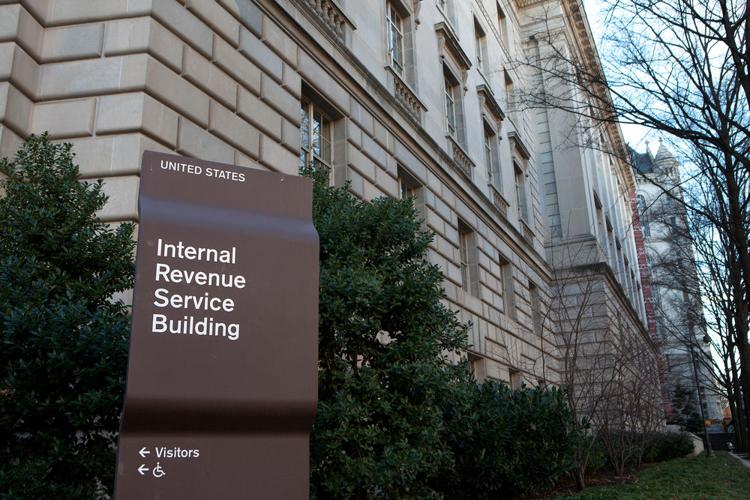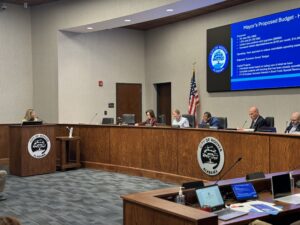Small businesses blast IRS over new tax credit announcement

Small businesses are crying foul after the Internal Revenue Service announced it would delay processing of a key tax credit, the latest in a series of delays for the agency. The IRS announced it will significantly slow its processing of Employee Retention Tax credits that have already been filed and not accept any new claims of this kind until next year. The agency says a flood of fraudulent attempts means it will have to take extra care to avoid fraud. The tax credit was meant to help businesses and nonprofits hold on to employees during the pandemic. Now, Small businesses say the IRS moving slowly means they will pay the price. “The IRS is increasingly alarmed about honest small business owners being scammed by unscrupulous actors, and we could no longer tolerate growing evidence of questionable claims pouring in,” IRS Commissioner Danny Werfel said in a statement. “The further we get from the pandemic, the further we see the good intentions of this important program abused. The continued aggressive marketing of these schemes is harming well-meaning businesses and delaying the payment of legitimate claims, which makes it harder to run the rest of the tax system. This harms all taxpayers, not just ERC applicants.” The National Federation of Independent Business, a leading small business group, blasted the IRS after the announcement, “While misleading marketing for the Employee Retention Tax Credit remains a problem, the IRS should not penalize the hundreds of thousands of small businesses that have followed the eligibility rules, correctly filed claims, and need help now,” Kevin Kuhlman, NFIB Vice President of Federal Government Relations, said in a statement. “NFIB has heard from many small business owners who are frustrated by the delays in processing claims and lack of communication from the IRS.” A recent NFIB survey found that small businesses are already hurting, in large part because of rising inflation. According to federal data, inflation spiked in August well beyond expectations. The NFIB poll of small business owners found that they cite inflation as their number one business concern, more than the labor shortage or anything else. Pandemic-era fraud led to hundreds of billions of dollars being taken from taxpayers across several government programs. Werfel, citing this kind of concern, seemed to suggest that processing could be delayed even further if needed to avoid fraud. “For those people being pressured by promoters to apply for the Employee Retention Credit, I urge them to immediately pause and review their situation while we look to add new protections and safeguards to stop bad claims from ever coming in,” Werfel said. “In the meantime, businesses should seek out a trusted tax professional who actually understands the complex ERC rules, not a promoter or marketer hustling to get a hefty contingency fee. Businesses that receive ERC payments improperly face the daunting prospect of paying those back, so we urge the utmost caution. The moratorium will help protect taxpayers by adding a new safety net onto this program to focus on fraudulent claims and scammers taking advantage of honest taxpayers.” Kuhlman said the IRS delay will only make things harder on small businesses. “By further delaying the processing of existing claims, the IRS is making it more difficult for small businesses to operate, keep employees, and create jobs,” Kuhlman said. Republished with the permission of The Center Square.
Katie Britt and Shelley Capito lead challenge to Joe Biden’s Waters of the U.S. rule

U.S. Senators Katie Britt and Tommy Tuberville joined Sen. Shelley Moore Capito and all of their Senate Republican colleagues introduced a formal challenge to the Biden Administration’s Waters of the United States (WOTUS) rule through a Congressional Review Act (CRA) joint resolution of disapproval. If both Houses of Congress pass a resolution rejecting a federal regulation under the CRA, that regulation is effectively nullified. This resolution comes after Joe Biden’s Environmental Protection Agency (EPA) and the U.S. Army Corps of Engineers announced a new rule in December 2022 repealing the Navigable Waters Protection Rule (NWPR), changing the definition of Waters of the United States in a way that will significantly expand federal regulatory authority over farmers, foresters, builders, developers, businesses, and even homeowners. “The Biden Administration in two years has racked up more regulations than the Obama Administration did in eight years,” Sen. Britt said. “They’re continuing their red tape regime with yet another reckless rulemaking decision that would prioritize their leftwing political agenda at the expense of hardworking Americans. This type of job-killing overregulation would strangle Alabama farmers, cattlemen, manufacturers, energy producers, builders, landowners, and small businesses.” “Alabamians have tended to our own land, waterways, and resources for generations, and we remain best positioned to preserve and utilize them for generations to come,” Britt said. Sen. Shelley Moore Capito is the Ranking Member of the Senate Environment and Public Works (EPW) Committee. “With its overreaching navigable waters rule, the Biden administration upended regulatory certainty and placed unnecessary burdens directly on millions of Americans,” stated Capito. “This Congressional Review Act resolution of disapproval will give every member of Congress the chance to stand with farmers, ranchers, landowners, and builders, and protect future transportation, infrastructure, and energy projects of all kinds in their states. I appreciate the widespread support we’ve received in both the Senate and House, and across the country, as we fight to place an important check on this misguided overreach from the Biden administration.” As Senator Capito introduced the CRA resolution in the Senate, U.S. Rep. Sam Graves, the Chairman of the House Committee on Transportation and Infrastructure (T&I), simultaneously introduced an identical resolution in the House. “As American families and businesses continue suffering under the economic crises caused by the disastrous Biden policies of the last two years, this Administration has inexplicably decided to move the country back toward the costly and burdensome WOTUS regulations of the past,” said Chairman Graves. “In an unnecessary drain on federal resources, the Administration clumsily put forward its rule before the Supreme Court has issued a ruling in the Sackett case, which will affect and alter what the Administration has put forward. Congress has the authority and responsibility to review onerous rules like this one handed down from the Executive Branch, and I hope our colleagues on both sides of the aisle will join in this effort to preserve regulatory clarity and prevent overzealous, unnecessary, and broadly defined federal power.” Numerous industry leaders and stakeholders have issued statements supporting the effort to overturn this rule. “As farmers, we want and need to protect the nation’s waters,” Alabama Farmers Federation President Jimmy Parnell said. “This rule muddies the water for property owners, will make conservation more difficult, and will create huge liabilities for farmers.” American Farm Bureau Federation (AFBF) President Zippy Duvall said, “Farmers and ranchers are committed to protecting the land and water they rely on to grow food for America’s families. Unfortunately, the back and forth over water regulations threatens the progress made to responsibly manage natural resources. We appreciate Congressmen Sam Graves, David Rouzer, and Senator Shelley Moore Capito for introducing a joint resolution to use the Congressional Review Act to stop the new Waters of the U.S. rule from going into effect. Farmers deserve rules that don’t require a team of attorneys and consultants to identify ‘navigable waters’ on their land.” The American Pipeline Contractors Association (APCA) said, “The American Pipeline Contractors Association is grateful for the introduction of this Congressional Review Act resolution and urges Congress to come together and swiftly overturn the new burdensome and unnecessary WOTUS regulations. There is widespread understanding in Washington that permitting reforms and regulatory overhaul are necessary to meet infrastructure goals and unlock the full potential of American energy, but this decision from the administration directly contradicts those goals. APCA urges the Biden administration to roll back this regulation as soon as possible and to instead work with Congress to undertake meaningful action toward reforming pipeline and general construction permitting processes.” American Road & Transportation Builders Association Vice President of Legal & Regulatory Issues Nick Goldstein said, “The recent Waters of the United States definition from the Environmental Protection Agency (EPA) would add more delay and confusion to the delivery of critical transportation improvements. By muddying federal Clean Water Act jurisdiction, EPA’s regulation directly contradicts the bipartisan infrastructure law’s goal of improving the project review and approval process. That’s why ARTBA supports House and Senate legislation to rescind the WOTUS rule.” Associated General Contractors of America (AGC) Vice President of Government Relations Jimmy Christianson said, “Senate Environment and Public Works Committee Ranking Member Shelley Moore Capito and House Transportation and Infrastructure Committee Chairman Sam Graves are right to express disapproval with the administration’s overreach and expansion of the waters of the United States regulatory program. AGC is disappointed that the agencies rushed through the sixth change in the requirements, in almost as many years, just as the U.S. Supreme Court is poised to decide on a related case. Employers try in good faith to keep pace with ever-shifting requirements that carry criminal as well as civil penalties for noncompliance.” Energy Marketers of America (EMA) President Rob Underwood said, “The Energy Marketers of America (EMA) recognize the enormous impacts the Biden Administration’s ‘Waters of the United States’ rule will place on small business energy marketers. In large part, WOTUS will determine whether costly land use restrictions will be imposed on new building or expansion projects, such as adding renewable liquid fuel pumps and/or electric charging stations. EMA supports the joint resolution of disapproval under the Congressional Review Act on the Biden Administration’s WOTUS rule.” Leading Builders of America CEO Ken Gear said,
Early divisions as Congress weighs next help for economy

The major question facing lawmakers will be what the next bill should look like, not whether to have one.


